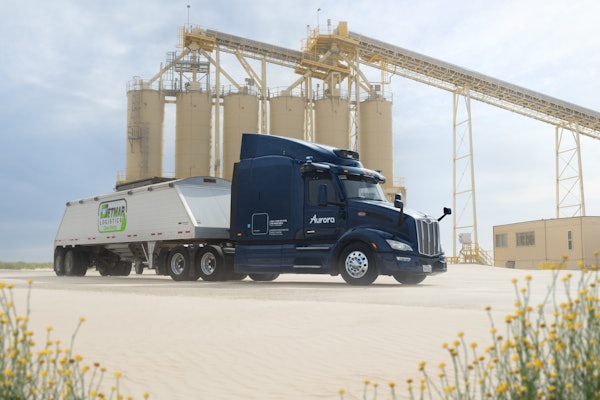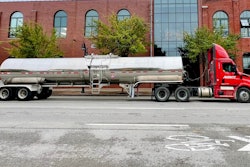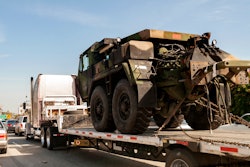Swift Enterprises
Location: Cleveland, Tenn.
Principal: Greg Swift
Equipment: 157 Kenworth T600s, T2000s and W900s equipped with Caterpillar C-15 Engines; Eaton Fuller Super 13-speed transmissions
Freight: General freight
Challenge: Running a growing trucking operation profitably with low overhead
Solution: Remaining a leased operator despite size and emphasizing driver productivity
Few fleet owners are satisfied when someone else calls the shots. But Greg Swift is. In fact, the president of Cleveland, Tenn.-based Swift Enterprises speaks of his 157-truck operation in surprisingly humble terms.
“Imagine a field with thousands of mice and a few big elephants,” Swift says. “Every time an elephant moves, mice get stepped on. They may not mean to, but every time the elephants take a step, they kill some mice. I’d rather be on the back of one of those elephants than on the ground floor.”
In Swift’s metaphor for the trucking industry, the elephants represent the mega-carriers – those with thousands of trucks. All other trucking companies are mice. If a mega-carrier wants a lane, for example, it can cut rates 10 cents a mile and get it, Swift says. The mice always get squished. “Many trucking companies with 500 or fewer trucks are disasters waiting to happen. Big carriers can undercut them at any time.”
But not Swift Enterprises. The company survives as one of the largest independent contractors in the United States, essentially immune to the tough competition most trucking companies of similar size face. The entire fleet of 157 trucks is leased to Chattanooga, Tenn.-based U.S. Xpress. As if not having to worry about rates, sales and marketing weren’t enough, consider what else Swift Enterprises is not responsible for:
- Log, safety and regulatory compliance;
- Trailers;
- Cargo and liability insurance; and
- Terminal overhead.
In a sense, Swift has outsourced these functions through his lease agreement with U.S. Xpress. In addition, a local dealer, Kenworth of Tennessee in Chattanooga, performs Swift’s maintenance. The result is a lean operation for a fleet its size. Aside from his drivers, Swift runs his operation, which generated $17.5 million in revenue in 2002, with a half dozen employees.
Swift’s brother, Brad, is executive vice president and chief financial officer. The company also has a director of operations, Cooksey Shugart, who oversees two operations managers. U.S. Xpress dispatches Swift drivers directly, but the operations managers monitor dispatch, arrange for maintenance, answer pay and benefit questions and ensure drivers get home time, vacation, etc. The only other employees are a recruiter and an executive secretary.
Turning bad times into good
Swift Enterprises has thrived at precisely the time most carriers have cut back on fleet size or, at best, held the line. Swift’s fleet more than doubled in size in 2001 and grew another 40 percent in 2002. This success is no accident, however. The very economic factors that drove many small carriers out of business are helping to drive Swift’s growth. Large carriers are leery of expanding with their own trucks, relying on owner-operators and small carriers to provide capacity and move additional freight. That has left ample room for fleets like Swift’s to contract out to a bigger carrier and move freight. Only there aren’t many other fleets like Swift.
“I know a lot of [independent contractors] with 50 or 60 trucks, but they usually hit a wall,” Swift says. Once carriers reach that size they run into financing and benefit issues. Drivers expect a fleet of that size to offer the pay and benefits large fleet’s offer. While such fleets may be able to compete on pay, they lack the structure or ability necessary to find benefits like 401(k) and health insurance as well as the mandatory workers’ compensation coverage at an affordable rate.
Swift has been able to provide these benefits and more by shopping around and by keeping other overhead expenses low. For example, Swift says he’s worked hard to keep workers’ compensation premiums low. The company is quick to challenge questionable claims, and for employees with legitimate claims, Swift provides light duty work for them in his office until they can get back on the road.
In the last year the company has had only three small claims out of more than 170 drivers. Swift Enterprises also has a good experience with health insurance, and Swift begins shopping for policies six months before they expire. “We’ve been through a lot of brokers,” he says.
Driver pay is competitive, and drivers usually see a minimum of one-half cent per mile more than they got from their previous employer, Swift says. “We offer good benefits, good pay, good miles and good equipment.” But drivers must be on time, safe and drive at least 10,000 miles a month – lessons Swift learned in the seat of his first truck.
Testing a business plan
Swift’s entry into trucking was unconventional. Tired of deskwork at the Department of Energy, where he had once served as director of training for the agency and was on the
Because Swift outsources his maintenance he has space at his office for his hobby – restoring classic Corvettes.
counter-terrorism team, the former Colorado State Trooper went looking for more action. Swift had studied trucking and thought he could make it work for himself. He developed spreadsheets on expenses and a cash flow model in his spare time. In January 1995, he resigned and enrolled in a trucking school.
Swift worked with a trainer at PST Vans for a month and drove by himself for a month. Then, in May 1995, he bought his own truck, a 1993 Kenworth T600 with 285,000 miles on it. Swift researched his moves carefully, choosing to lease onto PST Vans based on conversations he had with dozens of drivers.
But Swift’s business plan did not include driving. He wanted to drive for a year to validate his research and analysis regarding how to make a living off trucking. “I wanted a good idea of profit and loss in one truck,” he says. By September he added three more trucks, and then got out of his truck at the end of the year. He joined U.S. Xpress when it absorbed PST in October 1998.
Swift learned quickly that trucks don’t become profitable until the last week of the month. “Most owner-operators don’t consider the fact that the business and the truck own them for the first three weeks of the month. The last week is when they make money for themselves, and that’s when they want to take off.”
That’s why Swift Enterprises trucks run at least 10,000 miles a month. If a driver can’t achieve that level, he won’t stay at Swift Enterprises for long, Swift says. “If they don’t know how to drive 10,000 a month or if they have too much home time need, they can’t stay.” That kind of productivity demand can make it difficult to retain drivers, and Swift certainly has his share of turnover. But at 80 percent, turnover is still better than many long-haul carriers, perhaps due to competitive pay and benefits.
Getting drivers and keeping them running miles is part of the plan Swift developed before he got into the industry. Another part deals with equipment. Swift was pleased enough with his T600 that he runs basically the same truck throughout the fleet, although he does run some T2000s and W900s. He uses the W900s to reward his best drivers, but he buys T600s because he knows what to expect from a repair and resale value over the life of the truck. One kind of truck with one kind of spec makes it simpler to benchmark.
Swift buys and trades a large number of trucks each year through Truck Enterprises, Inc., a Kenworth dealer in Richmond, Va. The relationship is strong and has grown over the years. In fact, the dealer once tracked down his original T600 and bought it for him as a gift.
Swift Enterprises uses Chattanooga Kenworth to maintain its trucks. Although maintenance through the dealer is more expensive than he would like, outsourcing has spared him the investment in building and staffing a shop.
All in one basket
Offloading administrative and maintenance chores has worked very well for Swift Enterprises, but Greg Swift recognizes that his decision to remain a contractor comes with a risk. He depends on U.S. Xpress for each and every load. It’s a precarious position for any fleet. But in a sense, that just simplifies a challenge inherent in running a trucking company. Instead of satisfying dozens of customers as a typical trucking company owner does, he has to keep only one happy.
Even so, at the urging of his bank and in accordance with his business plan, Swift is beginning to diversify. Following the same model, he inked a deal with Schneider National and plans to add 50 to 75 trucks to that venture by this summer.
Swift knows he will get the same question in the new venture as he gets now: Why don’t you get your own authority? Many drivers dream of being independent owner-operators, Swift says. When they reach that level, they dream of owning a fleet, getting their authority and their own loads. “That’s ego,” he says. “They don’t want to work for someone else.”
But owner-operators and small fleets always work for someone else anyway, Swift argues. They never get complete independence because someone bigger can always muscle them out of the way, he says. And if being an independent contractor means giving up some independence, there are plenty of offsetting benefits for Greg Swift. Consider cash flow. “We don’t spend time worrying about receivables aging. We get paid in 5 to 7 days after completing a load, not 30 to 90 days like carriers with their own authority,” Swift says.
“We get paid 84 cents a mile,” he says. “While other fleets fight over loads, I get to haul them. And it’s quiet over here. I just lease them a driver and a truck.” For Swift, it’s a formula that works.










